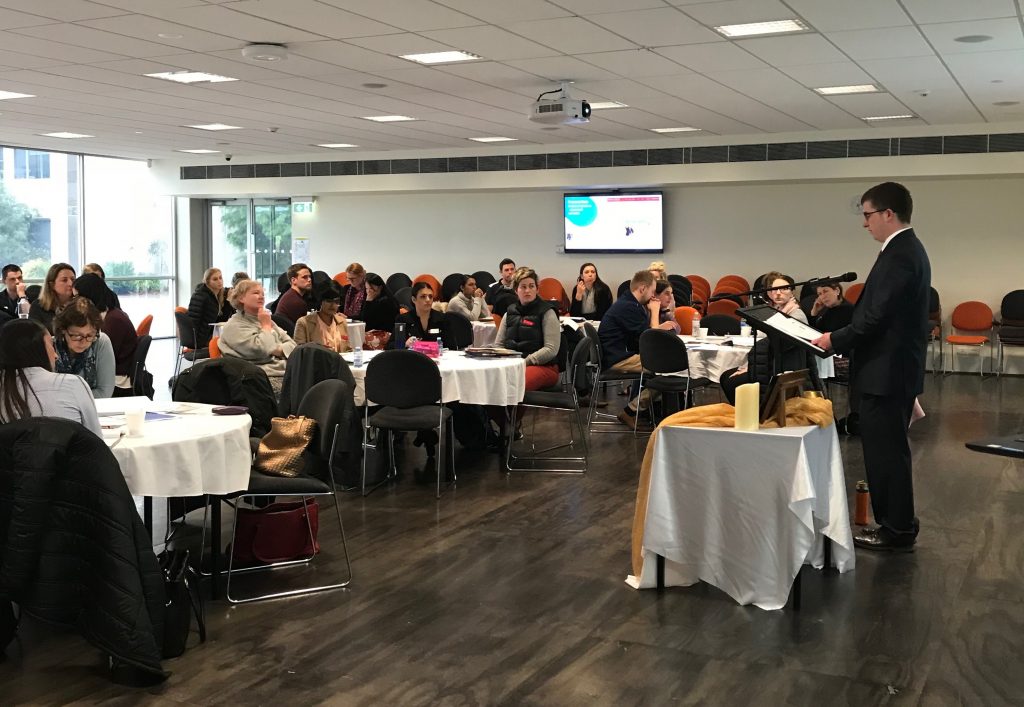Catholic Education Melbourne Eastern Region Beginning Teachers Network keynote address, Aquinas College, 11 May 2018:
In March 2018, I wrote the article Teaching Public Issues in Catholic Schools in Eureka Street magazine. I was interested in naming the fear which I saw present in my colleagues studying the “Transition into the Profession” unit at Australian Catholic University that February in Sydney. They were afraid to teach in Catholic schools because they might “say the wrong thing” on controversial issues of the moment. Their fear surprised me and woke me up to my desire that Catholic education be a privileged place of encounter where we seek a way to truth together.

Every day, every class, every conversation … in schools we are helping to form consciences. Conscience formation is a fundamental building block for Catholic education. An informed conscience will lead to freedom from fear. It will support the growth of moral imaginations. It will encourage faith.
True education models and facilitates important conversations. For Catholic education, church teaching offers something special when it is raised in a context of dialogue. When the church’s teaching dominates a delicate conversation there is a degree of alienation. It is a living teaching to be encountered at different levels. So a classroom which encourages a conscientious reaching for truth will necessarily go deeper than superficial catch phrases. Today we will spend time wondering about how to have important conversations.
Why dialogue?
Ever since the dawn of language, learning has been caught up in dialogue. Today, learning occurs in constant conversations between students and teachers, students and parents, parents and teachers, and of course teachers and teachers like those occuring between us today. More fundamentally, learning occurs as a dialogue in the most intimate rooms of the self. And the most inner room of the self is a privileged place where God seeks our company. Catholic schools facilitate classroom dialogue as a sacred encounter – in the meeting of minds we find self and others and God.
In these dialogues I can come to encounter what matters. I can come to realise what I believe to be important. I can meet people who have positions which build on different value systems to my own. I can wonder about why we may differ and what we hold in common. I can learn how to listen at depth to what others are saying.
When there is a common understanding that together we seek a way to truth, then we can understand another’s position at a rather deep level. This can lead to privileged moments of encounter. There we uncover meaning, we come face to face with insight, we find light for our thinking and we discover cause for wonder.
Why be a Catholic educator today?
As part of my own response to this question I would like to offer a passage from Jesus’ mission statement in Luke’s Gospel – chapter 4, verses 16-21:
When he came to Nazareth, where he had been brought up, he went to the synagogue on the sabbath day, as was his custom. He stood up to read, and the scroll of the prophet Isaiah was given to him. He unrolled the scroll and found the place where it was written:
“The Spirit of the Lord is upon me, because he has anointed me to bring good news to the poor. He has sent me to proclaim release to the captives and recovery of sight to the blind, to let the oppressed go free, to proclaim the year of the Lord’s favour.”
And he rolled up the scroll, gave it back to the attendant, and sat down. The eyes of all in the synagogue were fixed on him. Then he began to say to them, “Today this scripture has been fulfilled in your hearing.”
Luke 4:16-21
In Catholic schools all that we do has a disposition of reverence because we find God’s presence among us – most especially within our students. As teachers, we are learners anointed with a mission to share what we have with those in our classrooms. Jesus’ mission statement in Luke is a mission statement which could just as readily apply to the mission of teachers in a Catholic school.
We can be good news for the poor among us – we can bring hope to those who struggle with learning, who struggle with life. We can release people from captivity – from prisons of the mind – and we can be released too. Learning can give sight to teacher and student alike – in our encounters we all learn to see with new eyes. Learning can free students from oppressive strictures of social injustice and personal doubt. Learning can be a special place where we all experience a year of the Lord’s favour.
To wax theological, we are invited to engagement in the world God loves; to grow in our attentiveness to God’s people before us in our classrooms and staffrooms; to engage in important conversations with our fellow teachers, students, and society because we know that the way to truth is walked together. In the encounter we meet God – who we reverence in the other.
How we have conversation on important public issues, controversies and debates has impact on our schools and larger communities. When we value the different perspectives enough on their own terms then we can begin to hear with new ears the church’s teaching too. We can have conversations “in good faith” where each voice is heard and valued.
How might Catholic Social Teaching offer something for dialogue on important issues?
I would like to propose that when we have the big conversations Catholic Social Teaching has a voice which speaks eloquently of what matters. It has something to say in dialogue on important issues and debates, not when it is imposed or it closes down conversations. But when it is welcomed as part of a broad conversation. Its key principles include:
– Human dignity – each person is made in the image and likeness of God. In the words of the Prophet Isaiah, each person is precious, honoured, and loved (Isaiah 43:4). In the words of Sandie Cornish, “each [person] has a transcendent dignity that can never be taken away, even if it is not always respected.”
– Common good – we have a responsibility to care for each other. The invitation is to work together to create social relationships which uphold the needs of all and help all to fulfil their potential. When we take special concern for the poor and excluded, their good will be good for all.
– Solidarity is about building the kind of community which identifies itself with those most in need such that we care for them – the dying, sick, widowed, refugee, unemployed, lonely, abandoned, abused, mentally ill.
Conclusion
So let’s have the conversations. Let’s model free and wide ranging dialogue. Let’s cast out all fear. Because if we are to be good news as teachers … HOW we facilitate conversations is just as important as WHAT we propose or WHY we propose it. We need to trust ourselves and one another such that we might seek truth together.
Leave a Comment




